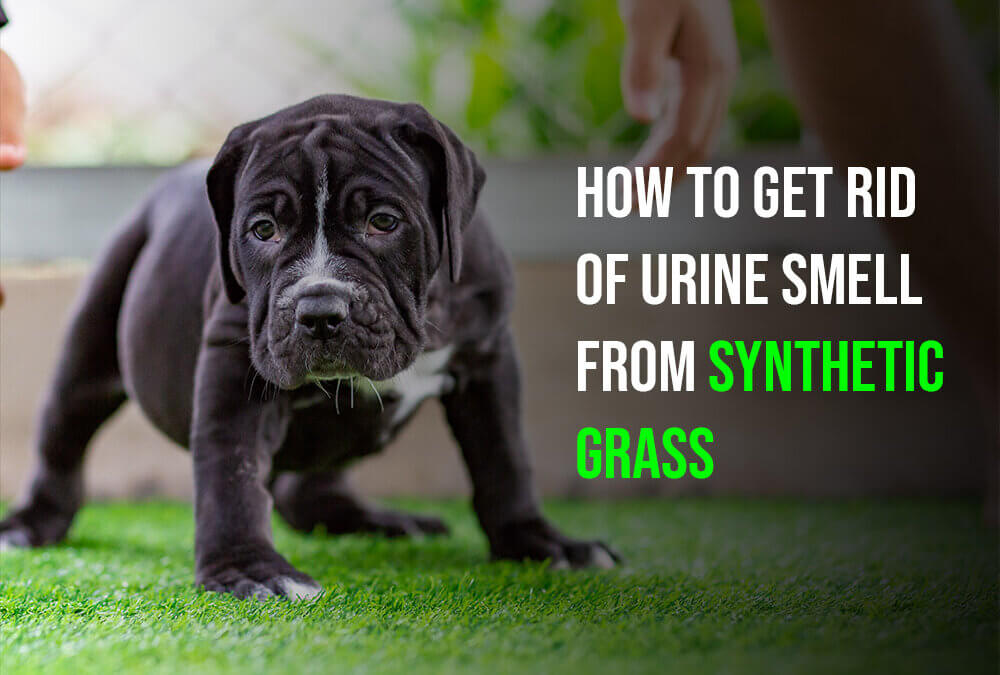You love your dogs, but you hate the nasty smell of urine in your yard. You’ve tried everything: baking soda, vinegar even liquid soap but nothing works. You can mow your yard to get rid of the urine-soaked turf. Still, it could take months for natural grass to grow back—and even then, there will still be a urine smell sticking around. The great news is that there’s an easy way to end this struggle. Install synthetic grass in St. Louis in your yard to ensure the smell never sticks around.
Why Is Urine Smell Hard to Remove From Natural Grass?
Dog urine consists of a mixture of water, urea and uric acid—all of which are water-soluble. It also contains ammonia, which does not evaporate easily. It’s the chemical that causes the smell.
When your dog pees on the lawn these compounds flow into the soil around the grass. The grass then absorbs the urine, which travels up through its vascular system and exits through small pores at the base of each blade.
But here’s where things get tricky: when you mow your lawn, you’re also cutting off those tiny pores. This prevents any more urine from being released.
If you want to remove the dog urine smell from real grass, you have two options. The first one is to wait until it rains so that all that excess water can wash away any remaining urine molecules. Your other option is to wait for the turf to dry out before mowing it,which may take several days.
Keep in mind that mowing or rinsing off urine doesn’t always remove the smell. After all, the soil under the turf can also hold onto odors and moisture like a sponge.
Why Does Artificial Turf in St. Louis Cope Better Against Pet Urine Than Real Grass?
If you’re looking for a way to deal with your dog’s urine in your yard, an artificial grass installation is definitely the best option. Not only is it good for dogs, but it also never retains that nasty pee smell for long. Here are the reasons why:
Not Porous
St. Louis artificial grass isn’t porous, so it doesn’t absorb fluids—including urine. That means that when your dog pees on it, the urine will just slide off its blades.
No Roots
It doesn’t have roots that take in fluids either. Even if your pup pees on pet turf, the urine will simply run off into the ground below.
Great Drainage
That means urine automatically slips from the blades within seconds of hitting them and into the drainage system below the turf. There’s no need to worry about having to mop up any messes later.
Easy to Clean
You can also wash and rinse off dog urine from artificial grass in St. Louis with water and soap—which are cleanup methods that you can’t use on real grass. After all, too much water and soap can kill natural turf.
How Do You Remove Urine Smell From Artificial Grass?
If your dogs have a habit of urinating on synthetic grass in St. Louis, don’t worry. It’s easy to get rid of the smell. Just follow these steps:
- Hose off any remaining pee from the grass.
- Use warm water or an enzyme cleaner to break down stubborn residues.
- Let the enzyme cleaner sit for a few minutes before wiping it off with paper towels.
- Apply an odor neutralizer in order to get rid of any remaining smell.
- Give the solution time to take effect. Check the soaking time that the deodorizer recommends.
You can find enzyme cleaners and deodorizers at pet stores.
How Do You Prevent Urine Smell in Artificial Grass?
If you’re looking for a way to prevent urine smell in fake grass, we have some tips for you.
- Train your dogs to use a designated bathroom spot in your yard.
- Clean up your dog’s messes immediately.
- Hose down your green synthetic turf regularly, so you can rinse off hidden pee spots.
Keep Your Yard Odor-Free With Artificial Grass in St. Louis
We know how hard it can be to keep urine smell out of your yard. That’s why we’re here to help!
Here at St. Louis Artificial Grass Experts, we offer a variety of turf products and services to keep your yard odor-free. That includes pet-friendly synthetic turf, installation services, landscaping solutions and even advice on how to care for artificial grass lawns.
Get in touch with us today if you’d like to learn more! You can contact us by completing our contact form or calling 314-947-6758.

